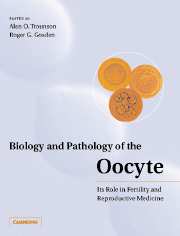Book contents
- Frontmatter
- Contents
- List of contributors
- Preface
- Part I Historical perspective
- Part II Life cycle
- Part III Developmental biology
- 6 Oocyte-specific gene expression: roles in folliculogenesis, fertilization and early development
- 7 Storage and functional recovery of molecules in oocytes
- 8 Endocrine regulation of meiosis - local and systemic hormonal influences
- 9 Checkpoint controls in mammalian oocytes
- 10 Fertilization: fate of sperm components after ICSI
- 11 Activation of the mammalian egg
- 12 Clinical applications in symmetry, asymmetry and polarity in early human development
- Part IV Pathology
- Part V Technology and clinical medicine
- Index
8 - Endocrine regulation of meiosis - local and systemic hormonal influences
from Part III - Developmental biology
Published online by Cambridge University Press: 05 August 2016
- Frontmatter
- Contents
- List of contributors
- Preface
- Part I Historical perspective
- Part II Life cycle
- Part III Developmental biology
- 6 Oocyte-specific gene expression: roles in folliculogenesis, fertilization and early development
- 7 Storage and functional recovery of molecules in oocytes
- 8 Endocrine regulation of meiosis - local and systemic hormonal influences
- 9 Checkpoint controls in mammalian oocytes
- 10 Fertilization: fate of sperm components after ICSI
- 11 Activation of the mammalian egg
- 12 Clinical applications in symmetry, asymmetry and polarity in early human development
- Part IV Pathology
- Part V Technology and clinical medicine
- Index
Summary
Biological principles of meiosis
Meiosis is the process unique to germ cells that reduces the chromosome number of the diploid (2n) state, characteristic of somatic cells, to the haploid (n) state, characteristic of a gamete (n = 23 for humans) (Baker, 1982). The complete process of meiosis consists of a phase of DNA synthesis, giving germ cells a DNA quota of 4c, followed by two consecutive divisions. In the first division, the chromosome number and DNA content are halved. In the second division, only the DNA content is halved. This yields four haploid products, none of which is likely to be genetically identical because of recombination at the diplotene stage of meiotic prophase. The first meiotic division of the oocyte is not completed until puberty, and the second meiotic division is only accomplished following fertilization.
Meiosis is a sexually dimorphic process in mammals (Handel and Eppig, 1998). In the female, meiosis is very protracted and particularly error prone, and is characterized by:
• a more or less synchronous and single initiation in a finite and limited pool of cells in the embryo;
• all the chromosomes having equivalent transcription and recombination activity during meiotic prophase;
• a gametogenic differentiation to form fully grown oocytes prior to the end of meiosis in the diploid phase;
• the progress of meiosis arrested at the end of the first meiotic prophase and reinitiated at a later time period when an extremely small number of follicles, each containing an oocyte, is selected for growth and meiotic maturation, stimulated by hormonal signalling;
• only one gamete being formed per meiosis in females compared with four in males; and
• a delay in the completion of meiosis for a long time (years in women).
The meiotic process, like mitosis, is subject to controls at various checkpoints during the cell cycle. But, unlike mitosis or meiosis in males, in females it requires additional cell cycle checkpoints for the protracted arrest at prophase of the first meiotic division (MI), and for arrest at metaphase of the second meiotic division (Mil). Much of what we know about these checkpoints in meiosis has come from research on eggs and oocytes from clams, frogs, starfish and sea urchins. Many of the genes involved in the mitotic and meiotic cycles were first identified in the fission yeast, Schizosaccharomyces pombe (see Murray and Hunt, 1993).
- Type
- Chapter
- Information
- Biology and Pathology of the OocyteIts Role in Fertility and Reproductive Medicine, pp. 113 - 119Publisher: Cambridge University PressPrint publication year: 2003



